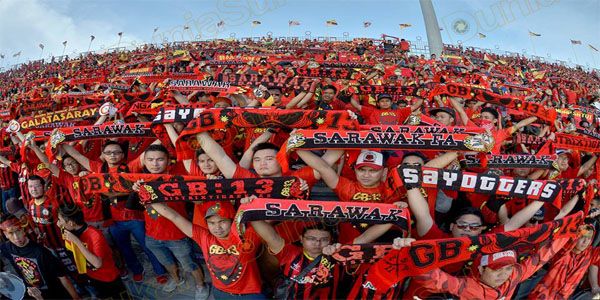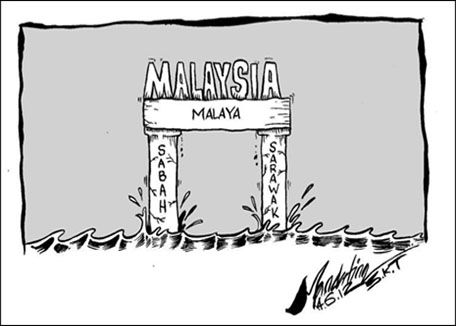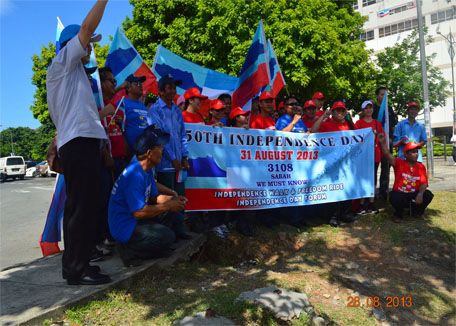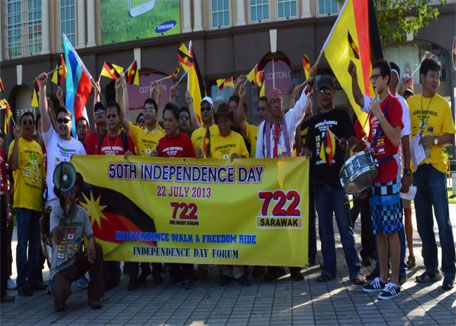|
|
Datuk Dr. Jeffrey Kitingan is the Chairman of STAR Sabah and State Assemblymen for N33, Bingkor, Sabah.
He also contested in P180, Keningau garnering 11900 strong votes
|
Kennedy School Graduate Held Prisoner
The Malaysian government is charging Jeffrey G. Kitingan with sedition and corruption. But the free Far East press and human rights groups say the Sabahan government official is a political prisoner.
----------------------------------------------
Many people associate a Harvard education with a bright future. Some Harvard graduates lead corporations; some win Nobel prizes; some become world leaders.
But for one, the future may lie in a jail cell.
Jeffrey G. Kitingan, a 1981 graduate of the Kennedy School of Government and a 1984 graduate of the Harvard-Tufts Fletcher School of Law and Diplomacy, is currently being held in a Malaysian jail. He is being charged with corruption and sedition by the peninsular Malaysian Kuala Lumpur (KL) government.
The KL government says it had a valid reason to arrest Kitingan, but the free Far East press and human rights groups such as Asia Watch believe he and possibly his brother, the chief minister of their native Sabah, to be political prisoners.
Harvard's John Fairbanks Center is currently working with the KL government to study the country's economic development and related social issues.
Kitingan was attempting to institute broad political and social reforms in his native Malaysian state of Sabah, according to Asia Watch.
Asia Watch is part of Human Rights Watch, an umbrella organization that targets countries known to violate human rights.
The State of Sabah
Sabah, once a British colony, joined with mainland Malaysia in 1963 to form a coalition government known as the National Front.
Sabah joined the coalition under a 20-point agreement that gave it some degree of autonomy over such areas as language, education, religion and finance, according the Far East Economic Review, a magazine which focuses on economic and related issues of that region.
"Sabah understood the guarantees to be in perpetuity," according to the magazine. "Federal leaders saw them as a transitory arrangement which would eventually fade away, leaving Sabah...with the same status as the [12] other states in the federation."
But Sabah's status began to change, culminating in the 1976 rewording of the 20-point agreement. Sabah was demoted from one of three major components of the National Front to just another state among the 13 in the federation.
Located on the island of Borneo, Sabah differs socially and culturally from mainland Malaysia. The state is largely composed of non-Muslim Malays, while the peninsular Malaysian population is 57 percent Muslim Malay.
Sabah went through a number of governments from 1963 to 1985 as its relations with peninsular Malaysia worsened. In 1985, the Berjaya party, composed of Malaysian Muslims sympathetic to the KL, was defeated by the Parti Bersatu Sabah (PBS).
The PBS, until recently part of the National Front, advocates greater autonomy for Sabah, saying the state should have more control over its resources and their development as well as a more democratic form of government. The party is dominated by the Christian Katazans.
Under the PBS, Sabah's new chief minister was Joseph P. Kitingan--Jeffrey Kitingan's brother. Kitingan himself became director of Sabah's Institute for Development Studies and director of the Sabah Foundation, responsible for investing Sabahan timber earnings and developing natural resources.
Timber production is the dominant industry in Sabah. The chief minister has traditionally allocated timber concessions, using his position to accumulate money and power. In addition, Sabah is rich in oil and mineral resource.
The Kitingans were at the forefront of those demanding more equality for Sabah in the form of redistribution of revenue from Sabahan resources, such as changing Sabah's off-shore oil drilling profit share from five percent to 50 percent.
The KL government, headed by Prime Minister Sari Mahathir, saw Sabahan requests for more autonomy as a threat. Tensions between the local Sabahan government and the KL government escalated as the KL government began to pressure the Kitingans, major players in the PBS.
In early 1990, Jeffrey Kitingan was arrested on charges of corruption. Despite the charges, Kitingan held on to his positions and witnessed his party's reelection in July 1990 on a platform of greater Sabahan autonomy.
Following the elections, the PBS withdrew from the National Front in October 1990, joining the opposition. The KL government responded by vowing to introduce competing Muslim Malay parties in Sabah.
Then, at the beginning of 1991, the KL government arrested Joseph Kitingan on charges of corruption. Several months later, Jeffrey Kitingan was arrested again, this time with six others said for plotting to separate Sabah from the Malaysian federation. Joseph Kitingan's status is at present unknown.
Since then, Jeffrey Kitingan has been in jail. He calls the multiple charges "political persecution," according to Far East Economic Review.
The Role of Religion
Observers say they are unclear how large a role religion plays in tensions between Sabah and pennisular Malaysia but say it is a factor. Although the mainland has a strong Muslim population and government, most Sabahans are non-Muslim. The PBS is dominated by the Christian Kadazans, and the Kitingans are both Roman Catholic.
Ambassador Leonard S. Unger '39 says he feels that, "The government in Kuala Lumpur...took measures to prevent local Christian officials from exercising authority...and did everything [it could] to discredit them. If there was to be a Christian government, they wanted to keep it under their thumbs."
An anonymous source, who is an expert on South East Asian politics, says the Malay government is becoming more fundamentalist. "There is a group of hunters and gatherers on the Malay peninsula, the Orangasli, that have their own religion. I've heard that officials have said, 'Once they become Muslim, our work is done,'" he says.
"Malaysia's a Muslim country and is growing more fundamentalist," says Charles H. Abelmann, a friend of the Kitingans. "The federal government doesn't like having a Christian state in a Muslim government."
Kitingan's 1991 arrest was under the Internal Security Act (ISA), which allows the government's security officials to arrest anyone posing a security threat without a warrant, according to Asia Watch.
"Those arrested can be detained for 60 days without charge or review, and the Minister of Home Affairs has the authority to extend the detention orders for up to two years, renewable indefinitely," said Asia Watch in a 1991 article on Malaysia detainees.
The ISA, effective since 1960, was originally intended to deter Communist insurgency. Tunku Abdul Rahman, prime minister at the time of Malaysia's formation, pledged that "the immense powers given to the government under the ISA would never be used to stifle legitimate opposition and silence lawful dissent," according to Asia Watch.
However, many charge that the ISA is being used exactly for these purposes in Sabah. Washington, D.C. director of Asia Watch Mike Jendrzejczyk says, "We believe that these arrests are in violation of international rights prohibiting arbitrary arrest and protecting the right to freedom of expression."
"Asia Watch has urged the Malaysian government to free the ISA detainees and to review the law as a step towards repealing it," he says.
In 1989, the ISA was amended by the Malaysian parliament, prohibiting courts from hearing habeas corpus petitions by ISA prisoners. Consequently, Kitingan can be held in jail indefinitely.
Mahathir, who doubles as the home affairs minister, is in charge of administering the ISA. Asia Watch reports that he "has acknowledged that the [amendment] was intended to strengthen the hand of the executive personnel, lest they become too 'wary' of detaining people under the ISA."
People familiar with the Kitingans and their recent arrests say they believe the two brothers were trying to improve Sabah through reforms.
"This guy is a crusader. He does everything for the people of Sabah," says Abelmann. "Unfortunately, in his position of advocating states' rights, he goes a little overboard...He's extremely motivated for his cause."
Abelmann lived with the Kitingans in 1989-90 as a worker in the People Development Program of the Yayasan Sabah Foundation, headed by Jeffrey Kitingan.
Kitingan was concerned about Sabah's control over its own resources and its own destiny, says Abelmann. "What you have here is a wealthy state with lots of natural resources that has become a poor state. The rate of development hasn't been what it should based on Sabah's natural resources."
Unger, who was one of Kitingan's professors at the Fletcher School of Law and Diplomacy, says he concurs with Abelmann's opinion. Unger says of his former pupil, "He was a good student [who] had more first-hand knowledge. He had good academic preparation, [but] was very lively and interested in the topic, not a bookish type at all. That doesn't mean that he didn't read and think about his country."
Unger, who was instrumental in the founding of the South East Asia Treaty Organization, says "Jeffrey was looking for an extension of democratic principles in a country with limited experience of democracy. He [attempted to] improve the rural situation by introducing new crops and... irrigation improvements." Unger says he served as an unofficial advisor to Kitingan.
The anonymous source, who is also familiar with the Kitingans, described the pre-Kitingan governments as being "extremely corrupt." Under Joseph, Sabah had its first modern government in which party politics were "not based on religion or ethnicity," says the source, who is familiar with Sabahan politics.
"You can't be a politician there without corruption...bribes...payoffs...this is the way that politics are run out there," he says.
"The Kitingans, to me, run a clean government," the source says. "Why weren't previous governments who were scandalously corrupt brought up on charges? The corruption was incredible."
What is to Come?
Jeffrey Kitingan and some of his supporters are currently in jail awaiting trial. But their future and the future of their country is uncertain, says the source. "No one knows what's going on over there," he says.
The situation is "nasty," says the source. "Jeffrey is in detention. The federal prosecutor...needs testimony from people in Hong Kong [to strengthen the KL's case]."
The KL government is attempting to build part of its case in the Hong Kong courts. But Kitingan supporters are asking people to testify before the Hong Kong courts and say that the KL case is politically motivated.
Hong Kong does not allow testimony about politically instigated charges on its territory. "The issue now is can enough information be provided to Hong Kong court to show that these are politically motivated charges?" says the source.
The source adds, "If [the government] overthrow[s] PBS by attempts to press charges against major figures of the [local] government and if [it] continue[s] to harass native leaders and the native government personally with threats of the ISA, so that people are unable to speak freely of their opinions, it hearkens a return to a more authoritative regime under the thumbs of the central government."
"It confounds me that there are so few people in America concerned with these human rights violations in Malaysia," the source concludes.





















